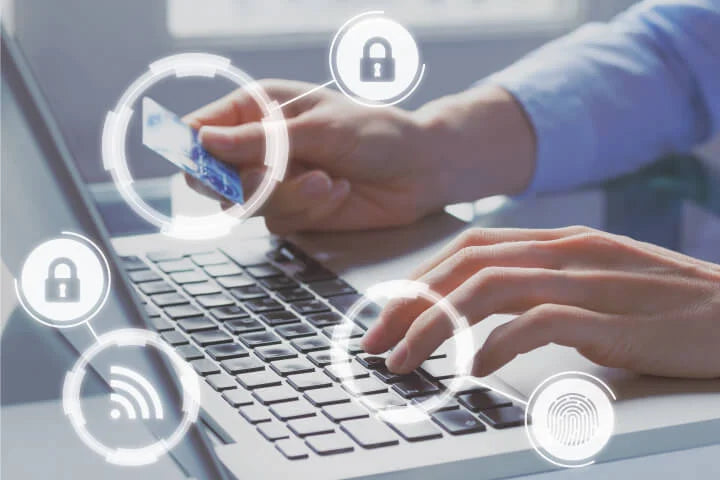Online shopping is convenient, fast and often cheaper than going to a physical store. However, it also comes with some risks such as identity theft, fraud and scams. In this blog post, we will share 12 best practices for shopping safely on ecommerce sites that will help you protect your personal and financial information, avoid scams and enjoy a hassle-free online shopping experience.
- Only shop on credible or well known websites: Start with trusted sites that have a good reputation and customer reviews. Avoid clicking on links from unknown sources or pop-up ads that may lead you to fake or malicious sites12.
- Protect your computer: Install antivirus software and keep it updated regularly. Scan your computer for malware and viruses before and after shopping online. Avoid using public computers or Wi-Fi networks for online shopping as they may not be secure2.
- Check for HTTPS: Make sure the site has SSL (secure sockets layer) encryption installed, which means the URL starts with https:// and has a padlock icon next to it. This ensures that your data is encrypted and secure when you enter it on the site2.
- Stay as private as possible: Only provide the necessary information for your purchase, such as your name, address, phone number and credit card number. Never give out your social security number, bank account details or other sensitive information that could be used for identity theft2. Use a service like Blur or Abine that masks your email address, phone number and credit card number when you shop online. This way, you can avoid spam emails, unwanted calls and unauthorized charges2.
- Create very strong passwords and use 2 factor authorization: Use a unique and complex password for each ecommerce site you use. Avoid using common words, names or dates that could be easily guessed by hackers. Use a combination of uppercase and lowercase letters, numbers and symbols2. 2 factor authorization gives an extra layer of strong protection by requiring the person signing in to confirm a code sent to their phone. If someone doesn’t have your phone they can’t sign in!
- Be wary of scams and to-good-to-be-true offers: Some ecommerce sites may try to scam you by offering too-good-to-be-true deals , asking for upfront payments , sending fake invoices , phishing emails , spoofing websites etc.4 Be careful of clicking on links or attachments from unknown senders , providing personal information over email , phone call text message etc., paying with untraceable methods such as wire transfer gift cards etc., buying from sellers who have no contact details feedback history etc.
- Check your bank statements (paper or online): Monitor your bank statements and credit card statements for any suspicious or unauthorized transactions. Report any discrepancies or frauds to your bank or card issuer as soon as possible2.
- Encrypt your Wi-Fi: If you use Wi-Fi at home or on your mobile device, make sure it is password-protected and encrypted. Avoid using open or unsecured Wi-Fi networks that could expose your data to hackers2.
- Use a VPN: A VPN (virtual private network) creates a secure tunnel between your device and the internet server. It encrypts your data and hides your IP address from prying eyes. A VPN can also help you access geo-restricted sites or deals that may not be available in your location1.
- Read reviews on sites you trust: Before buying anything online, read customer reviews about the product quality, delivery time, customer service and return policy of the seller. Look for verified reviews from real customers who have bought the product before1.
Some more points to add:
- Compare prices: Use price comparison tools or websites to find the best deals on products you want to buy online. You can also use coupons or promo codes to save money on your purchases1.
- Check shipping costs: Some ecommerce sites may offer free shipping or low shipping fees depending on the order amount, location or delivery method. Others may charge high shipping fees that could increase the total cost of your order significantly1. Check the shipping costs before placing an order online.
- Know your rights: As an online shopper, you have certain rights such as receiving accurate product information, getting a receipt of purchase confirmation email , being able to cancel an order within 14 days without giving any reason , being able to return faulty goods within 30 days , being entitled to a full refund within 14 days of cancellation or return , being protected by consumer laws against unfair terms , misleading advertising , fraud etc.3
Conclusion:
Online shopping represents a phenomenal advance in shopping and convenience but proper vigilance and care should be taken to protect oneself from scams, hackers, fraud and identity thieves. Thankfully, using the above methods should make shopping online as safe or likely safer than shopping at brick and mortar stores.
Happy Shopping!
Learn more:
2. pcmag.com


Share:
Improve Package Security While Reducing Work Interruptions
Gearbrain Review